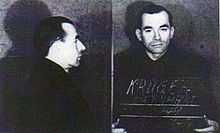Bernhard Krüger

Bernhard Krüger (German pronunciation: [ˈbɛʁnhaʁt ˈkʁyːɡɐ]; 26 November 1904 – 1989) was a Schutzstaffel (SS) Sturmbannführer (Major) during World War II, the leader of the VI F 4a Unit in the Reichssicherheitshauptamt (Reich Main Security Office) or RSHA.
This SD unit was responsible for, among other things, falsifying passports and documents. Within the setting of Operation Bernhard, the SD forged pound notes in great numbers, funding Nazi Germany with ₤600 million in high-quality counterfeit currency (worth approx. $6 billion 2009). This counterfeiting operation was named after Krüger, who led the operation from a segregated factory built at Sachsenhausen concentration camp, manned by 142 Jewish inmates. Krüger was a member of the NSDAP.
The pound counterfeiting operation ended in 1944. Not wanting to go to the Eastern Front, and mindful of the fate of the concentration camp prisoners in his employ if his factory were closed, Krüger succeeded in establishing a new operation to forge American dollar notes. Instructing his workers to work as slowly as possible[citation needed], he managed to stall the operation until the war ended, permitting the prisoners to be liberated after they were transferred to camps in Austria in May 1945.
One of the forgers, Adolf Burger survived the war and stated that "Major Krüger was in no way like Oskar Schindler. He was a murderer just like everyone else, six weeks before the war ended he had six people shot just because they were sick. He couldn't send them to hospital in case they said something about the operation, so he killed them."[1]
After the war, Major Krüger was detained by the British for two years, then turned over to the French for a year. He said they asked him to forge documents but that he refused. He was released in 1948 without any charges being pressed, and returned to Germany. In the 1950s, he went before a denazification court, where inmates under his charge at Sachsenhausen provided statements that resulted in his acquittal.[2] He eventually worked for the company that had produced the special paper for the Operation Bernhard forgeries. He died in 1989.
References
External links
Literature
- Murray Teigh Bloom; "The Brotherhood of Money" 1983. ISBN 0-931960-12-6
|